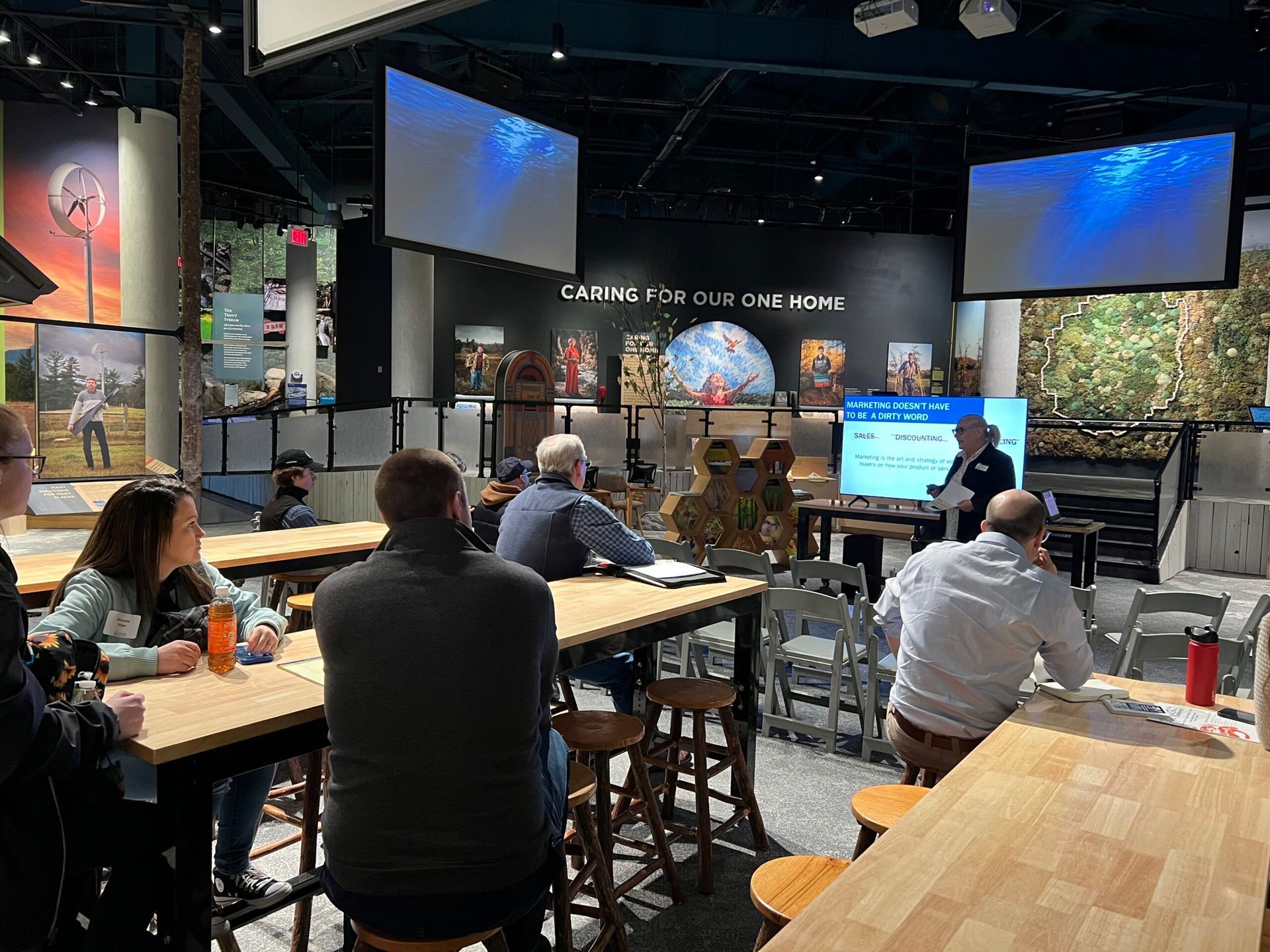Adirondack Common Ground Alliance 2020 Blueprint for the Blue Line
For Governor’s staff, Commissioners, Senior Agency Staff, Legislative leaders and their staff
November 2019
On July 24, 2019, the Adirondack Common Ground Alliance forum in Lake Placid attracted more than 250 stakeholders focused on solutions for multiple issues important to the region and New York state. With many of you or your designees attending, people celebrated collaboration among diverse stakeholders and honored leaders including the Lt. Governor Hochul, and state, local and non-governmental entities who are working together for a better future for the Adirondack region. Real challenges were recognized; there was positive energy and appreciation to the state’s leaders for their commitment to the area. We thank you for your support.
The 2020 Blueprint for the Blue Line is a summary of recommendations for state actions to benefit the Adirondacks that were a direct result of Common Ground Forum discussions. As you will see, some of the recommendations have already been achieved. While not included in this document, any necessary landbank legislation, overuse of the High Peaks, Adirondack Park Agency reforms, affordable housing and education issues are continuing priorities. Thank you for the opportunity and your consideration of these Adirondack priorities.
Adirondack Communications Infrastructure (cellular, broadband, emergency) :
– Issue : While improving in places, the current coverage and infrastructure for cell phones, broadband and emergency communications is inadequate, and in places getting worse.
– Executive Ask : Ask the Governor to assign members and staff to the Communication Task Force announced in the 2019 State of the State, and include representation from the Adirondacks ( done ).
– State Funding Ask : Fund 100% of the last mile 100 meg broadband coverage in the Adirondack Park.
Clean Water Infrastructure :
– Issue : The State’s $1.0 billion 2019 clean water grant program, plus loans, are appreciated, but when grants are capped at 25% of costs projects are underfunded where residents can’t afford a 75% share.
– State Policy Ask : Continue existing grants and loans and establish a supplemental grant program for the needs of hardship communities requiring funding that exceeds the current 25% cap.
– State Funding Ask : Continue to increase technical assistance and engineering grants to support local leaders to meet public and private clean water challenges. Renew Clean Water grant funding.
Climate Change :
– Issue : C limate change is the issue of our lifetime and is impacting human and natural communities in the Adirondacks. The Park can play a unique role in the fight to slow the warming of our planet.
– State Legislative Ask : Incentivize carbon sequestration and forest ownership by putting a value on carbon and developing new (forest) tax laws that promote long term stewardship of forests that protect carbon sinks and productive forests for non-market and market values.
– State Policy Asks : Appoint regional representation for the Climate Council and/or advisory panels, create a climate communication advisory panel, and draft a Park renewable energy opportunity plan.
Invasive Species :
– Issue : Aquatic invasive species constitute one of the greatest threats to the future of our Adirondack economy and environment. Terrestrial invasive species are a growing threat too.
– State Legislative Ask : Strengthen and extend the Aquatic Invasive Species Transport Law and increase enforcement.
– State Funding Ask : Increase funding for aquatic invasive species research, education, spread prevention, rapid response and management through the EPF and other sources.
Road Salt :
– Issue : O ver-application of road salt is negatively impacting drinking water quality and public health.
– Legislative Ask : Create a blue-ribbon panel, including State Agencies, scientists, winter road maintenance experts and representatives of the legislature and Attorney General’s office to develop recommendations to measurably reduce road salt contamination in groundwater and surface water.
(legislation introduced November, 2019)
– State Policy Ask : Develop and implement a Park-wide salt reduction pilot program.
Transportation :
– Issue : As the region prepares for the 2023 World University Games in Lake Placid, there are significant challenges and opportunities to modernize the way people travel to and through the Park .
– State Ask : Form (and fund) an Adirondack Transportation Working Group to study use patterns and needs; study transportation at the community level; inventory existing transportation facilities, expertise; align communication and transportation needs; and generate recommendations.
Making Communities in the Adirondacks more Welcoming to new and existing Residents and Visitors :
– Issue : T he Adirondack Diversity Initiative plays a critical role in supporting the Adirondacks as a region that is more welcoming and inclusive to visitors of all backgrounds and experiences.
– State Funding Ask : Sustain funding for the Adirondack Diversity Initiative (ADI) for staffing and programming to implement collaborative trainings, outreach, education, and programs.
Empowering Local Ownership: Readying new Entrepreneurs, and Positioning Communities for Success:
– Issue : Existing state programs should be scaled to match rural needs with shorter applications, by emphasizing the quality of the jobs created (not the number), and incentivizing co-op and employee ownership.
– State Policy Ask : Tailor and size existing state programs for small rural Adirondack-North Country needs.
– State Funding Ask : Increase funding for marketing and promotion of Main Street business assistance.
Competitive Regional Strategy :
– Issue : The Adirondacks face demographic and economic challenges that could be overcome with a region-wide strategy that aligns around competitive assets and new opportunities.
– Funding Ask : Provide funding to develop a regional competitive strategy to attract more residents and improve the visitor experience.
Adirondack Analytics (What Information Exists, What Information is Needed and for Whom?) :
– Issue : While much economic, social, demographic and ecological data exists and more is on the way, access and organization is problematic to decision makers. This hinders policy and budge decision-making while leaders are trying to be more efficient and effective.
– State Policy Ask : Establish a central functional data repository relevant to a variety of social, economic, environmental topics in the Adirondack Park as a model for the state and the nation.
– State Funding Ask : Designate long-term funding for Adirondack research and distribution of results.
Thank you for your generous support of the Adirondacks. Please let us know if Adirondack Common Ground Alliance core team members might meet with you. We look forward to helping you advance common goals.
CGA contacts: Zoë Smith (518) 327-6276, Ross Whaley (518) 359-9631 or Cali Brooks (518) 523-9904
The post 2020 Blueprint for the Blue Line appeared first on Common Ground Alliance.


